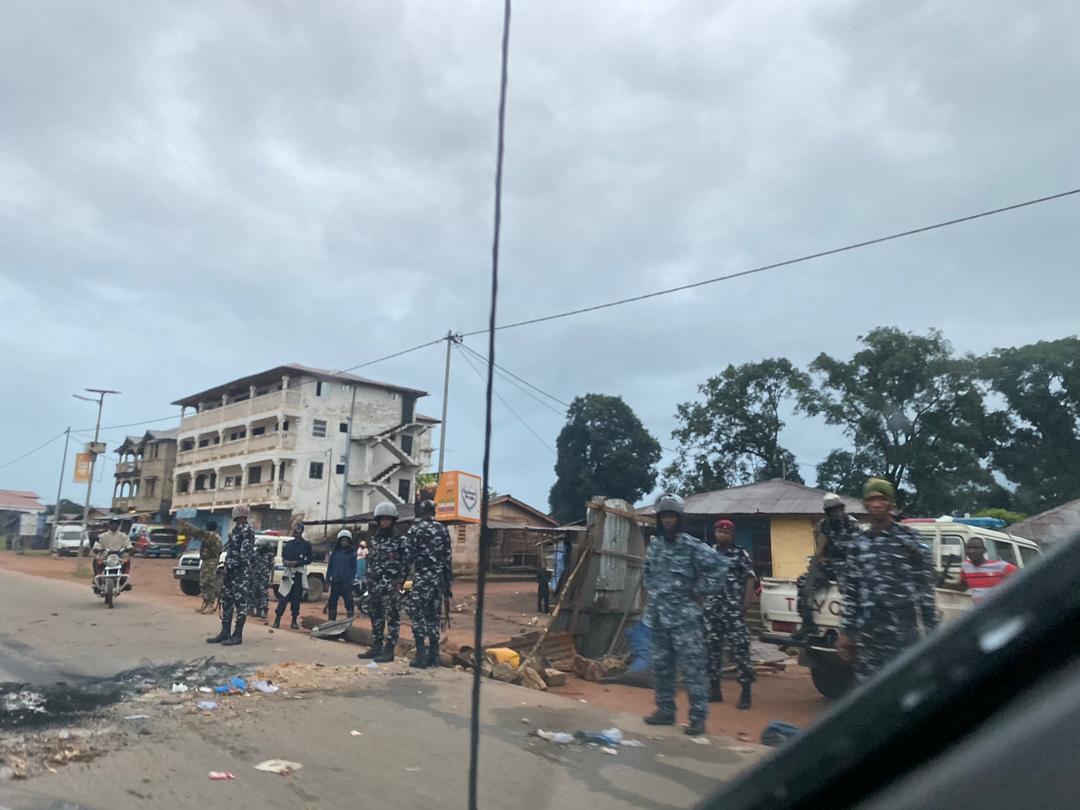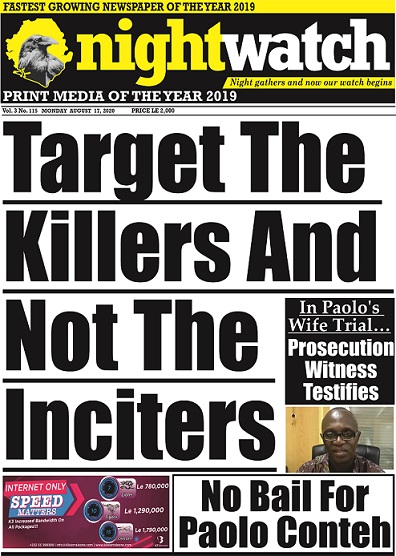As a country governed by the rule of law, Sierra Leone is calling investigators of Makeni riots to focus on those in whose hands six lives were lost in the North-eastern headquarters. The celebrated principle of ‘the greater absorbs the lesser’ could be employed.
The principle in plain terms means the most serious offence should be considered at the detriment of a lesser one. In other words, it is no wrong for an investigator to drop a minor offence for a felonious one.
For better elucidation of the principle, several instances and scenarios could be invoked. No reasonable investigator would concentrate on an offence of assault at the expense of a crime of wounding with intent.
The answer is simple: wounding with intent is much more serious than assault. The offence of wounding constitutes a potent threat to life than assault as it seeks to permanently disfigure or maim the offended. Similarly, a competent criminal investigator would not ignore burglary at the expense of a simple larceny.
The former, by its nature, is weightier than the latter. In all instances mentioned above, those felonious crimes usually land in the high courts that have legal authority to hand down verdicts on them. Magistrates conduct preliminary investigation or committal proceedings when such matters come before them.
It is extremely difficult for the offended to withdraw such matters in court without recourse to prosecutors since they are serious offences against the state.
Seasoned criminal investigators and lawyers in the finest of jurisdictions will not hesitate to subscribe to the time-honoured investigative principle. It is a principle held in high esteem in nations that aspire to meet the ends of legal justice and establish the kingdom of Almighty God on earth. The principle, most times, has been used by state counsels in offering advice on counter matters in police files.
Where a person reports a case of wounding with intent and the other person reports a case of assault at any police station, both will be recorded and investigated. The two case files on the two reports will be packaged and sent to law office for advice.
Government lawyers study the two files, look for the facts and fit them within the framework of the law, and later advise the police to charge for the weightier offence.
Sometimes, experienced police investigators would not hesitate to automatically drop the crime of assault by mere endorsement of the two medical forms by a pathologist.
Those scenarios above are just to premise on what the public needs to know on killings by security operatives in the home of the former President. Makeni, once a peaceful town woke up to an indiscriminate firing by trigger-happy police and military personnel over the relocation of a 1.65KVA thermal plant from the North-eastern headquarters of Makeni to the North-western town of Lungi.
The relocation of the electricity generator, by all indications, was not properly communicated to the youths who are the largest and most energetic. The disgruntled and irate youths saw the relocation as a naked disadvantage to them and resisted it outright. Security operatives responded and the response was lethal. Six casualties became the product of police and military response.
The brutal killings did not go down well with Sierra Leoneans at home and abroad and protested the callous acts. Parliamentarians, last week, staged a protest in parliament wearing T-shirts with inscription: ‘MAKENI LIVES MATTER.’ The continued protests became a clarion call for government to investigate circumstances that led to the killings.

Media reports have it that the team is now in Makeni to investigate the killings. At the early stage of the investigation, media publications insinuate that the Mayor of Makeni City, Her Worship, Sunkarie Kabba and others would likely be charged for incitement.
The question that has been asked most frequently is: If Makeni Mayor and others would be charged for incitement, what about the killers? Are they sacred cows?
Within the context of criminal investigation, murder is much more serious than incitement. In conducting such investigation, the most fundamental question investigators must ask themselves is: who provoked the violence that led to the killings?
The question is relevant in that for any investigation, one has to concentrate to the triggers and the responses. In a situation of this nature, one would say the decision of Energy Distribution and Supply Agency (EDSA) to relocate the thermal plant was the trigger of the conflict. Some Sierra Leoneans would also say the conflict was fuelled by the lack of effective communication and engagement with the community to see the relocation as necessary and expedient.

The communication strategy would have been one that assures the community that electricity would be there in the absence of the thermal plant. In the absence of such communication and engagement, the youths responded to stop the relocation prompting a counter-response from security operatives.
To ensure that the rule of law gains a foothold in a country that has just emerged from war, those police and military personnel who killed must first be arrested and indicted. Humbling them in the courts would send a loud and clear message to Sierra Leoneans that society does not tolerate unjustifiable killings.
What is clear in the police response is that the principle of proportionality has been nakedly flouted. In all media reports, there was no evidence indicating that the rioters were armed during the riots.
All what the youths needed was to stop the machine being transferred from Makeni to Lungi.
Another contentious point in the investigation was the early intervention of the army in the riots.
Sierra Leone is a country that prides in a policy document known as the Military Aid to Civil Power. The policy confers police primacy in the maintenance of the state’s internal security. The cardinal principle in the MACP is that military intervention in internal disorder of whatever form is an apparent lack of police capacity to handle the situation.
The principle simply means police human and material resources must have been outstretched to a point where it is clear that they cannot restore order. But, in the Makeni riots, the army came in earlier. It also another entry point to the investigation to rope in the killers. The argument goes: If the Makeni Mayor is threatened with an incitement charge, what about the killers.
Should they go free and continue to kill?


